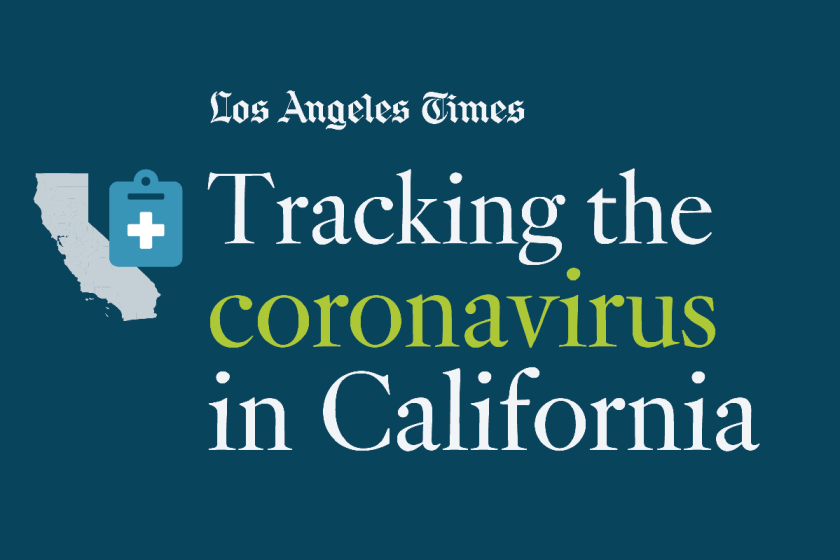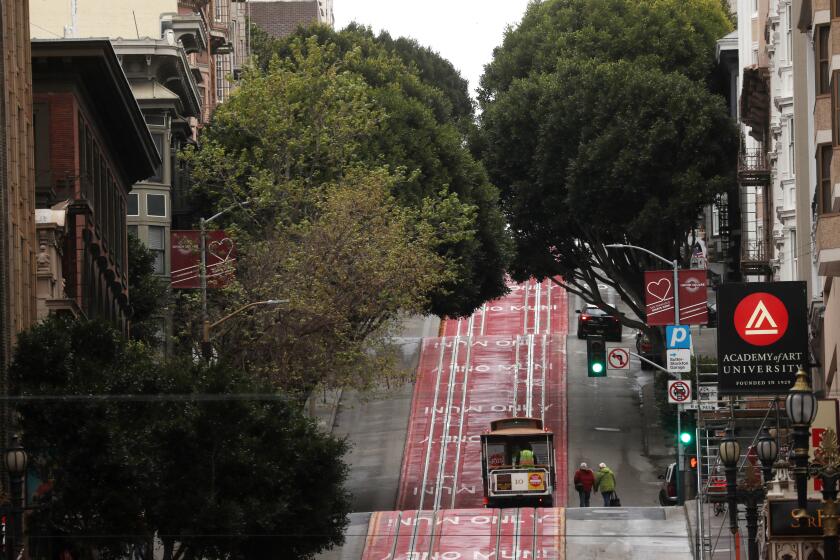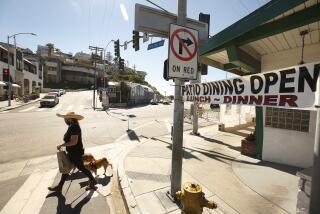How the San Francisco Bay Area coronavirus ‘shelter in place’ order works
At least 17 counties in California, centered on the San Francisco Bay Area, have issued shelter-in-place or shelter-at-home orders to slow the spread of coronavirus. Here’s how it works.
Why it’s being done
The San Francisco Bay Area is the hardest-hit region in California with regards to coronavirus cases. More than 450 have been reported in the nine Bay Area counties (Alameda, Contra Costa, Marin, San Francisco, San Mateo, Santa Clara, Sonoma, Napa and Solano), which issued the orders this week.
In Santa Clara County alone, 189 cases were confirmed and more than 60 have been hospitalized. Officials expect the number of cases to worsen. Other counties around the state issued similar orders this week — Santa Cruz, Monterey, San Benito and San Luis Obispo in the Central Coast area; Sacaramento and Yolo in the Sacramento Valley, which includes Davis and West Sacramento; Mendocino and Lake in the North Coast area.
Officials say slowing the spread of the virus is urgent to prevent hospitals from getting overwhelmed. Older adults and those with underlying medical conditions are most at risk for critical illness, with their bodies unable to fight off a viral infection of the lungs that can result in a failure to breathe on their own, septic shock and multiple organ failure.
The latest maps and charts on the spread of COVID-19 in California.
“Some individuals who contract the COVID-19 virus have no symptoms or have mild symptoms, which means they may not be aware they carry the virus,” the order said. “Because even people without symptoms can transmit the disease, and because evidence shows the disease is easily spread, gatherings can result in preventable transmission of the virus.”
What does the order say?
Officials are directing the public to stay at home as much as possible, with certain exceptions, such as to go out and get food at supermarkets, pick up prescriptions at the pharmacy, buy gas, go to the bank and check up on relatives.
More than half a dozen San Francisco Bay Area counties issued similar orders asking almost all people to stay home as much as possible to help reduce the spread of the new coronavirus.
“You will still be able to walk your dog, or go on a hike alone or someone you live with, or even with another person, as long as you keep 6 feet between you,” Dr. Grant Colfax, the San Francisco director of health, said at a press conference.
Certain essential activities are exempt, such as essential government and business services or essential public infrastructure construction, like housing. Essential activities are defined below.
Counties in the greater San Francisco Bay Area region issued a coronavirus ‘shelter-in-place’ order. Here’s the text of the order, issued by Alameda County; similar orders have been issued in San Francisco and the counties of Marin, San Mateo, Santa Clara, Contra Costa and Santa Cruz.
The order goes into effect at 12:01 a.m. Tuesday. It’ll continue until 11:59 p.m. on April 7, unless rescinded earlier or extended.
What kinds of businesses are now ordered closed?
- All bars and nightclubs
- Gyms and recreation facilities
Essential businesses are urged to remain open. A list of them is below.
Are restaurants and cafes ordered closed?
Restaurants and cafes can remain open for takeout and delivery.
How big can gatherings be now?
All public and private gatherings of any number of people outside a single household or living unit are now banned, with certain exceptions listed below.
What kind of travel is banned?
All travel, including by car and public transit, is banned except for essential travel or essential activities, as defined below. Public transit riders should try to stay 6 feet away from others.
What about homeless people?
Homeless people are not subject to this order but are urged to find shelter.
How will it be enforced?
San Francisco Police Chief Bill Scott said police are asking the public to voluntarily comply. While violation of the health order could be enforceable as a misdemeanor, “that is an absolute last resort,” Scott said. “This is not about a criminal justice approach to a public health issue.”
What are essential activities that are still allowed to occur?
- To do things essential to health and safety of the household, including pets, like getting medical supplies, visiting a clinic or hospital, or obtaining supplies to work from home.
- To obtain needed services or supplies, like buying groceries.
- To engage in outdoor activities like walking, hiking or running, while keeping 6 feet away from others.
- To do work defined as essential business, defined below.
- To care for a family member or pet in another household.
- To continue working for a healthcare operation, like a hospital, clinic, dentist’s office, pharmacy, pharmaceutical and biotech company, a healthcare facility, healthcare supplier, home healthcare service, mental health provider, veterinary office or other related services.
- To continue working for construction projects needed for essential infrastructure, such as building housing, airport operations, and work on water, sewer, gas, electrical, oil refining, roads and highways, public transportation, solid waste collection, internet, and telecom systems.
- To continue working as first responders, emergency management personnel, emergency dispatchers, court personnel, and law enforcement. Anyone needed to ensure the continuing operation of government agencies and provide for the health, safety and welfare of the public is exempt.
People at high risk for severe illness, such as the elderly and those with underlying medical conditions, are urged to remain at home except as needed to seek medical care.
Health officials in seven Bay Area counties ordered only essential services stay open, San Mateo’s mayor said. The order will last three weeks.
If you go out, what are you supposed to do?
- Stay 6 feet away from other people — the distance at which virus-infected saliva can travel in someone’s cough or sneeze; wash hands with soap and water for at least 20 seconds often or use hand sanitizer; cover coughs and sneezes; stop shaking hands;
- Other than healthcare workers and other essential workers, if you have a medical condition that puts you at risk for serious complications for the coronavirus, stay at home;
- For employers, take all steps needed to allow workers to work from home to the extent possible.
What are essential businesses under this order?
- Healthcare operations
- Grocery stores, certified farmers’ markets, farm and produce stands, supermarkets, food banks, convenience stores, and other establishments that sell canned food, dry goods, fresh fruits and vegetables, pet supplies, fresh meats, fish and poultry, and household products such as cleaning and personal care products.
- Food cultivation, like farming, livestock and fishing
- Businesses that provide food, shelter and social services and other necessities of life for the needy
- Newspapers, TV, radio and other media services
- Gas stations, auto supply, auto repair and related facilities
- Banks and related financial institutions
- Hardware stores
- Plumbers, electricians, exterminators, and other service providers who provide services that are necessary to maintaining safety and sanitation
- Businesses providing mailing and shipping services, including post office boxes
- Educational institutions — including public and private K-12 schools, colleges and universities — for purposes of facilitating distance learning or performing essential functions
- Laundromats, dry cleaners, and laundry service providers
- Restaurants and other facilities that prepare and serve food, but only for delivery or carry out. Schools and other entities that typically provide free food services to students or members of the public may continue to do so under this order on the condition that the food is provided to students or members of the public on a pickup and takeaway basis only. Schools and other entities that provide food services under this exemption shall not permit the food to be eaten at the site where it is provided, or at any other gathering site
- Businesses that supply products needed for people to work from home
- Businesses that supply other essential businesses with the support or supplies necessary to operate
- Businesses that ship or deliver groceries, food, goods or services directly to residences
- Airlines, taxis and other private transportation providers providing transportation services necessary for essential activities
- Home-based care for seniors, adults and children
- Residential facilities and shelters for seniors, adults and children
- Professional services, such as legal or accounting services, when necessary to assist in compliance with legally mandated activities
- Childcare facilities providing services that enable employees exempted in this order to work as permitted. To the extent possible, childcare facilities must operate under the following mandatory conditions:
- Childcare must be carried out in stable groups of 12 or fewer (“stable” means that the same 12 or fewer children are in the same group each day).
- Children shall not change from one group to another.
- If more than one group of children is cared for at one facility, each group shall be in a separate room. Groups shall not mix with each other.
- Childcare providers shall remain solely with one group of children.
Can I still get an eye exam or teeth cleaning?
A separate upcoming order will require routine medical appointments and elective surgery be canceled or rescheduled.
What if my business is not an “Essential Business”?
Owners and employees are allowed to perform minimum basic operations, like activities to maintain the value of the business’ inventory and ensure security, and to ensure other workers being able to work remotely from home.
Will the local government close?
“Essential services” by city and county government will remain operational, such as police, fire, hospitals, clinics, jails, courts, garbage, public transportation, water, power and gas, office uses like payroll, security and administration, public works construction including construction of housing and airport operations.
Can I still get deliveries?
Yes.
Can I use a rideshare or taxi?
Yes, for essential activities.
Can I go to the laundromat or dry cleaner?
Yes.
Can nannies still work?
Yes, in some instances, like if the nanny provides health care for the child, or if the child lives with you. Nannies are also permitted to work if parents are required to work away from home for essential services.
More to Read
Sign up for Essential California
The most important California stories and recommendations in your inbox every morning.
You may occasionally receive promotional content from the Los Angeles Times.












